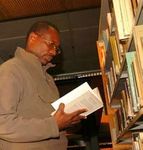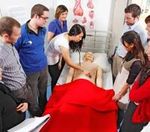Bachelor of Medicine Bachelor of Surgery - (BM BS)
←
→
Page content transcription
If your browser does not render page correctly, please read the page content below
Faculty of Education and Health Sciences Bachelor of Medicine Bachelor of Surgery (BM BS) Graduate Entry
Welcome to the University of Limerick Graduate Entry Medical School, where our uniquely practical and interactive approach to learning shapes exceptional individuals who contribute in a positive way to the world of medicine. UL’s BM BS Graduate Entry Medical Programme is open to graduates from any discipline. It has a highly innovative curriculum which offers students the opportunity to complete undergraduate medical training in four years in an environment specifically designed for graduate students. During your four years of study, you will be taught the basic medical and clinical sciences necessary to form the basis for postgraduate training and for a career in any branch of medicine.
Programme Outline
Years 1 & 2 Overview
Autumn / Spring Years 1 and 2
In each of the first two years, the curriculum is further divided
BM4001 Knowledge of Health & Illness 1 into six learning units, covering different topic areas. Areas
Year 1
covered by each unit include:
BM4011 Clinical & Anatomical Skills 1 – Life Structure: Musculo-skeletal system, Rheumatology,
Orthopaedics, Trauma, Plastic Surgery, Skin & Dermatology
BM4021 Professional Competencies 1 – Life Cycle: Reproduction & Development, Child Health
(Paediatrics), Obstetrics & Gynaecology, Sexual Health,
Ageing, Death
Autumn / Spring – Life Maintenance: Alimentary System, Gastroenterology,
Endocrinology, Renal Medicine, Urology, Nutrition
BM4002 Knowledge of Health & Illness 2 – Life Protection: Immunology, Infection, Haematology,
Oncology, Preventative
Medicine, Genito-Urinary Medicine
Year 2
BM4012 Clinical & Anatomical Skills 2 – Life Support: Cardiology/Cardiovascular Surgery,
Respiratory Medicine, ENT
– Life Control: Nervous system, Neurology/ Neurosurgery,
BM4022 Professional Competencies 2
Vision & Ophthalmology, Psychiatry, Psychology
BM4022 Special Study Module (SSM) (3 weeks)
Year 3 & 4 Student Rotations
The structure of teaching and learning in Years 3 & 4 will involve student rotations through the major clinical disciplines. Typically, the
year is structured as follows:
Autumn Spring
BM4003 General Practice/Primary Care (18 weeks) BM4053 Medicine 1 (9 weeks)
Year 3
BM4023 Special Study Module (SSM) (3 weeks) BM4063 Surgery 1 (9 weeks)
BM4023 Professional Competencies 3
Autumn Spring
BM4054 Obstetrics & Gynaecology (6 weeks) BM4034 Medicine 2 (6 weeks)
Year 4
BM4064 Paediatrics (6 weeks) BM4044 Surgery 2 (6 weeks)
BM4074 Psychiatry (6 weeks) BM4084 Special Study Module (SSM) (6 weeks)
BM4084 Professional Competencies 4Programme Of Study Special Study Modules (SSMs)
The curriculum is taught in a traditional academic year. Special Study Modules (Electives) allow students to study
Years 1 & 2 are taught on campus and consist of 33 indepth areas that are of particular interest to them. In total,
teaching weeks per year starting in September. Years 3 students undertake three SSMs, one in each of Years 2, 3 and
& 4 commence in August and consist of clinical training, 4. Students have considerable choice over the subject of these
where students rotate through the major clinical disciplines projects, but the format for assessment is prescribed. Some
in affiliated hospitals and General Practices. students might choose to undertake their SSM locally and
others may go abroad to complete these electives.
The curriculum has three main modules or domains:
• Knowledge of Health & Illness Early Patient Contact Programme
• Clinical and Anatomical Skills During the first two years, you will be assigned to two real
patients and will be expected to follow their progress and life
• Professional Competencies
experiences over time. One patient will have a chronic and
The above domains or themes run concurrently and possibly progressive medical problem (e.g. diabetes, arthritis,
underpin all learning across the four years. They are multiple sclerosis); the other patient will be an expectant mother
designed to ensure that all aspects of the skills required to and you will be expected to monitor her progress through her
be a doctor are addressed, from the sciences underpinning pregnancy and, subsequently, the early development of her
a rational approach to diagnosis and management, to an child.
awareness of the importance of personal development. Over the two years, you will be expected to come to know your
patients, first and foremost, as people. You will also be expected
to be involved when they interact with health care services (e.g.
you might accompany them when they visit their GP or hospital
out-patient clinic; you might visit them in hospital etc.).
The aim of the programme is to help students to understand
both health and illness and how each is managed from the
patient’s perspective. You should also come to appreciate the
strengths and deficiencies of health services. Above all, you
should gain some insights into the relationship between the
providers and the consumers of health care.How you will be taught By working through the problem and hypothesising about what
is wrong with the patient, the PBL group comes up with a list
of learning issues that represent the key knowledge needed
Years 1 & 2 to understand what is happening to the patient. The group
The first two years of the course are structured around members then independently research these learning issues in
Problem-Based Learning (PBL). This is backed up by a small their own time.
number of lectures. There will also be structured clinical skills At the next PBL tutorial, the group discusses what they have
teaching and anatomical skills teaching. Teaching in the learned and the tutor distributes the next stage of the problem.
Professional Competencies takes the form of lectures, tutorials, The new information is discussed, new learning issues arrived
workshops and seminars on topics such as psychology, public at, and members again research independently.
health, health law & ethics and medical sociology. All sessions
are focused towards the topic of the week and exploring it The group report back again and the final stage of the problem
from different perspectives including the scientific, sociological, is explored and the case concluded. By this time, the group is
public health, legal and patient experience. This means that likely to have worked through:
everything you learn is done in the context in which you will use – The original presentation of the patient (either at A&E, an
it when you practice as a doctor. outpatient clinic or a GP clinic)
Years 3 & 4 – The history taken by the doctor
In Year 3, all students will be located in the General Practice/ – The examination findings
Primary Care setting in one of five Primary Care Teaching
Networks (PCTNs) for 18 weeks. For the remainder of Year – Any investigations ordered and their findings (e.g. blood
3, students will undergo hospital-based clinical training in results, x-rays, biopsies, etc)
Medicine and Surgery. Three weeks in Year 3 is devoted to the – The course of the patient’s illness (over hours, days, weeks,
SSM. months or years) and the impact of this on the patient’s life
In Year 4, students will spend 6 weeks of Clinical Training in – Treatment (pharmacological, surgical, psychiatric, etc)
each of Obstetrics/Gynaecology, Paediatrics and Psychiatry.
– The involvement of family and others close to the patient
They will also undertake another 6 weeks in Medicine &
Related Specialties and a further 6 weeks in Surgery & Related – Any complications that might have arisen
Specialties. This will involve rotations through a number of
– The outcome of the case (including rehabilitation, ongoing
affiliated hospitals. Six weeks in Year 4 is devoted to the SSM.
community care, etc.)
What Problem-Based Learning (PBL) really means Independent learning times are not just about reading from
The ‘problems’ are highly structured hypothetical clinical cases, textbooks. During these times, students are encouraged to visit
each of which takes a week to work through. Each semester, and make use of facilities of the Anatomical Skills Education
students are divided into groups of seven or eight, each with Unit and Clinical Skills Education Unit.
its own tutor in a tutorial room, with PC, state of the art AV Staff will be on hand to provide support in whatever area you
equipment and walls lined with whiteboards. The group meets feel you need it. However, to a large extent, students in the
with the tutor to work through the week’s case. The tutor does programme will be both encouraged and expected to assume
not act as a teacher, but as a facilitator, guiding the group a high level of responsibility for their own learning. Students will
through the sequence of steps which have been devised to not be ‘spoon fed’ and there is a deliberate strategy to minimise
help students learn from the clinical cases. Each step and new the amount of didactic teaching in the curriculum.
development in the case (such as results of investigations or
details of drugs prescribed) is only given out after the group has
finished discussing the previous step.
A typical timetable for Years 1 & 2 of the Graduate Entry Medical Programme:
Time Mon Tues Wed Thurs Fri Key:
PBL = Problem-Based Learning
9-10 PBL (3) PC (1) PC (2) Lecture
PC (1) = Professional Competencies
relating to psychology, social and
10-11 PBL (1) PC (1) PC (2) Lecture community aspects of health care,
epidemiology, biostatistics, Public
11-12 PBL (1) Health Medicine, Occupational
Medicine and Complementary
12-1 EPCP Medicine.
PC (2) = Professional Competencies
1-2 relating to the humanities, critical
reasoning, evidence-based medicine,
2-3 Lecture PBL (2) health service organisation, health
Clinical economics, health law and ethics,
Skills self-awareness and self-care
3-4 Lecture PBL (2)
Clinical Anatomical EPCP = Early Patient Contact
Skills Skills Programme
4-5Entry requirements and how to apply EU applicants EU Entry Requirements Candidates must hold a minimum 2.1 (second class honours, grade one) result in their first honours bachelor degree (NFQ Level 8). For candidates who meet this requirement, GAMSAT (Graduate Australian Medical Schools Admissions Test) will then be used as the sole instrument to select students for the programme. EU Application Process Applications must be made through the CAO. Information about applying through the CAO is available at www.cao.ie. The course code for the Graduate Entry Medical Programme is LM101. Non-EU applicants Non-EU Entry Requirements Candidates must hold a minimum 2.1 (second class honours, grade one) result in their first honours bachelor degree (NFQ Level 8). For candidates who meet this requirement, GAMSAT (Graduate Australian Medical Schools Admissions Test), or in the case of North American applicants, MCAT will be used as an instrument for selection. Non-EU applicants must also attend for interview as part of the selection process. Non-EU Application Process Applications must be made directly to the University. Application forms are available from the website: http://www.ul.ie/internationaleducation/ and must be returned to: International Education Office, University of Limerick, Limerick, Ireland. North American applicants should contact The Atlantic Bridge Programme for admissions, applications and information on financial aid at www.atlanticbridge.com Additional information Further information, including information on Fees and Semester dates can be found on the Medical School website: http://www.ul.ie/medicalschool The contents of this brochure are for information purposes only and should not be viewed as the basis of a contract between a student and the University. No guarantee is given that the programme, syllabus, fees or regulations may not be altered, cancelled or otherwise amended at any time.
IRISH / EU ADMISSION ENQUIRIES Admissions Office Tel: 00353 (0) 61 202015 Email: admissions@ul.ie www.ul.ie/admissions INTERNATIONAL ADMISSION ENQUIRIES International Education Division Tel: 00353 (0) 61 202414 Email: int.ed@ul.ie www.ul.ie/internationaleducation GRADUATE ENTRY MEDICAL SCHOOL Faculty of Education and Health Sciences, University of Limerick, Limerick, Ireland Tel: 00353 (0) 61 234851 Fax: 00353 (0) 61 233778 Email: medicalschool@ul.ie www.ul.ie/medicalschool
You can also read



























































